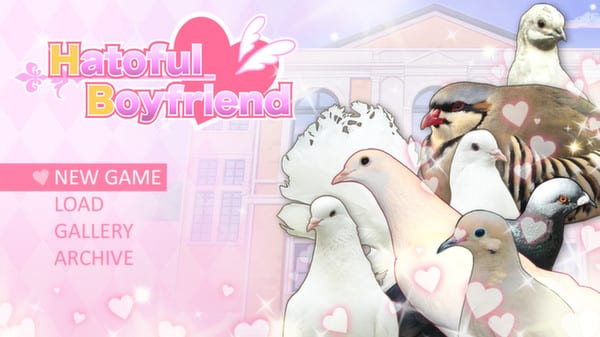It is said that love knows no bounds. It doesn’t discriminate, and you don’t choose it – it chooses you. The artistry of romance, when a pair of souls intertwine, is a chaotic and tenuous experience. Indeed, the idea that two people could meet, somewhere among the billions of people wandering the thousands of miles of this planet, who are yet destined to be eternally bound is pure magic.
…This is the part where you select either ‘That’s beautiful!’ or ‘Umm…’ depending on which route you’re intending to take.
Known in Japan as the otome game (which means either maiden game or virgin game, depending on how you translate it and/or how creepy you want to sound), dating simulators have been around for longer than you’d expect. Even back in the Super Nintendo era, starry-eyed dreamers were able to bewitch a range of eligible suitors, all with their unique personalities and foibles. Angelique was widely considered the first of its kind back in 1994, and nowadays, there are more of them than the average person could possibly handle.
So what exactly is the appeal of these whimsical, quirky titles?
One avid member of the community; a fan fiction writer who goes by the pseudonym of Serensama, explains, “otome games are popular because it lets the players play out their fantasy fulfillment in a safe environment that they can control. These sorts of games can let the player indulge in partners they normally wouldn’t choose in real life, and play out a romance that would never appeal to them in a real-world setting – they’re fun.”
Matchmaking elements aren’t that uncommon in mainstream games, particularly when the protagonist is a blank, customizable character that can be molded in the player’s image. Farming simulators like Harvest Moon and Stardew Valley are obvious examples; wooing and marrying one of the town’s residents becomes a game in and of itself – for some, the most significant part, and the primary reason for replaying.
Even non-simulation games have dabbled in the fine art of seduction; in the Fire Emblem series, it is a strategic procedure for yielding the best children and covering units’ weaknesses with appropriate pairings. But beyond that, in newer titles like Awakening and Fates, the playable avatars are the player by proxy: you marry, you procreate, you poke their face – because apparently, that’s what couples do in Hoshido and Nohr.
But the full dating sims? They’re on a different level altogether; a playable storybook opening the door to an alternate reality, where people can live out their dreams of dating mysterious strangers, or tragic introverts. Or pigeons. Let’s not forget pigeons.

There is something intrinsically hypnotic about these titles, and as a result, many of them feature a thriving community of supporters crafting their own interpretations of the characters and stories. Mystic Messenger, from South Korean developer Cheritz, first released for mobile devices in July of last year, and it has already led to the creation of hundreds of short stories known typically as head canons, combining any number of pairings and scenarios involving the game’s colorful cast.
Serensama continues, “the player gets to go through an emotional journey with these characters, and most of the time the deeper the player can get into the psyche of the characters, the better; the more joyous and fulfilling the gameplay. The communities around otome games, in general, are so passionate about them because we feel like we’ve been there in the game. Fallen in love – sometimes multiple times in different ways with different partners – and had our hearts broken, too. These visual novel type games involve the player by giving them the story and the dialogue and scant imagery, but everything else is envisioned by the player – your mind is literally transported to a world that you made in your head to fill in the gaps, so it makes sense why there is a level of attachment that players have that may seem to go far and above what other gaming genres tend to evoke.”
With the wealth of games on offer, chances are there will be some kind of variation of the formula that will appeal to almost anyone. Any specific niche you could imagine has probably already been covered; Samurai Love Ballad: PARTY whisks you off to the ancient Sengoku era of Japan, where your potential mates are historical warlords. The current darling doing the rounds, Dream Daddy, features a cast of eligible young fathers for you to pursue. Purrfect Date is an upcoming Steam title that allows you to date – yep, you guessed it – cats.
Considering the rapidly growing demand, dating sims are bound to keep popping up, each with another twist or wrinkle to add that helps set it apart from the rest. It may not be for everyone, and indeed, some may find the whole thing a touch unsavory, but Serensama concludes that the reason for the success of this unusual genre is fairly straightforward.
“At the end, just like any game, it’s a form of escapism. Though while many games these days are geared to escape through combat and warfare, or endless series of puzzles and quests – otome games allow the player to traverse through time and space and love… and that’s freaking fantastic.”
